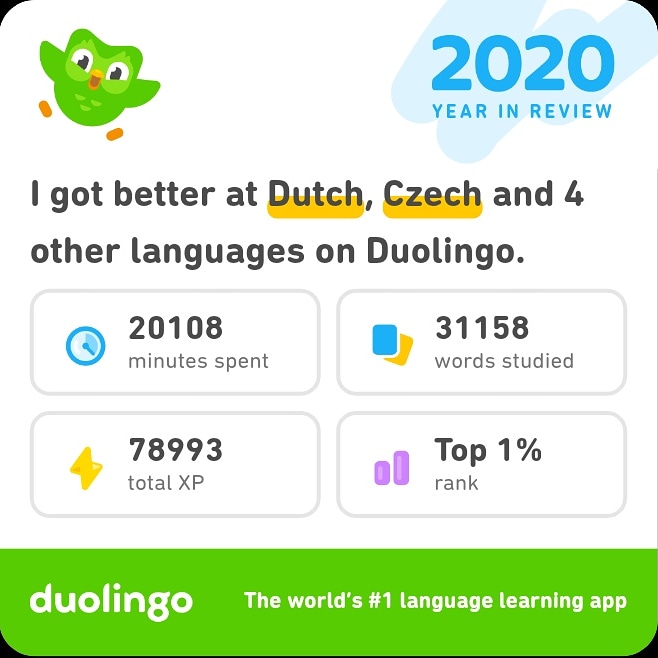I’ve been studying various languages on Duolingo for nearly four years now. My current streak is at 1,238 days today, and I had a 96 day streak before then, so for the past 1,334 days I have been studying at least a little every single day. This year I’ve averaged about 1 hour a day, and at the moment I’m focusing on Dutch and Spanish. Last week I came top of the diamond league – the highest you can get.

So far I’ve completed courses in Swedish, Danish, Russian, Czech, Esperanto, Spanish and Romanian. The courses and the app have changed quite a bit – more for some languages than others. New lessons, tips and levels have been added, especially for Spanish, which has at least 3 or 4 times more lessons than the other languages I’ve studied. That makes sense, I suppose, as there are currently 28.6 million people learning Spanish on Duolingo – far more than any other language. Today I noticed that there are new grammar lessons in Spanish, which are useful, and there are also Spanish podcasts, which I haven’t listened to yet.
One aspect of Duolingo I’m not keen on is the hearts system. At the start of each day you have 5 hearts. Every time you make a mistake you loose one. If you run out of hearts, you can ‘buy’ more, refresh a topic you have already completed to gain more, or wait until the next day. Or you can subscribe and get unlimited hearts. Making mistakes is part of language learning, and not something you should have to worry about, as long as you learn from them. You sometimes get tips when you mistakes in Spanish, which are useful, but not in other languages.
If you’ve studied other languages on Duolingo, how do they compare to Spanish in terms of numbers and types of lessons?
I expect that there are more lessons, etc for French, German, Japanese, Italian, Korean and Chinese – the most popular languages after Spanish – than for less popular languages.
I tried studying Italian with duolingo but became frustrated with it quickly. I was struggling with elementary things for a long time, and was not developing any good study system from simply quizzing myself on the same handful of words and sentences. When I spoke to my mother about it who is already semi-fluent in Italian, she said it was the worst language she had looked at on the site and contained many errors in terms of natural language.
When Japanese entered beta I tried that out. I’m semi-fluent in the language and was more interested in assessing the system than learning. I found that this also had many elementary errors and that if you pointed this out people who did not know the language would argue with you from the position of “logic.”
I think it does depend on the language, but my experience with duolingo has so far been that it was barely better than nothing, as it taught very slowly, and sometimes incorrectly.